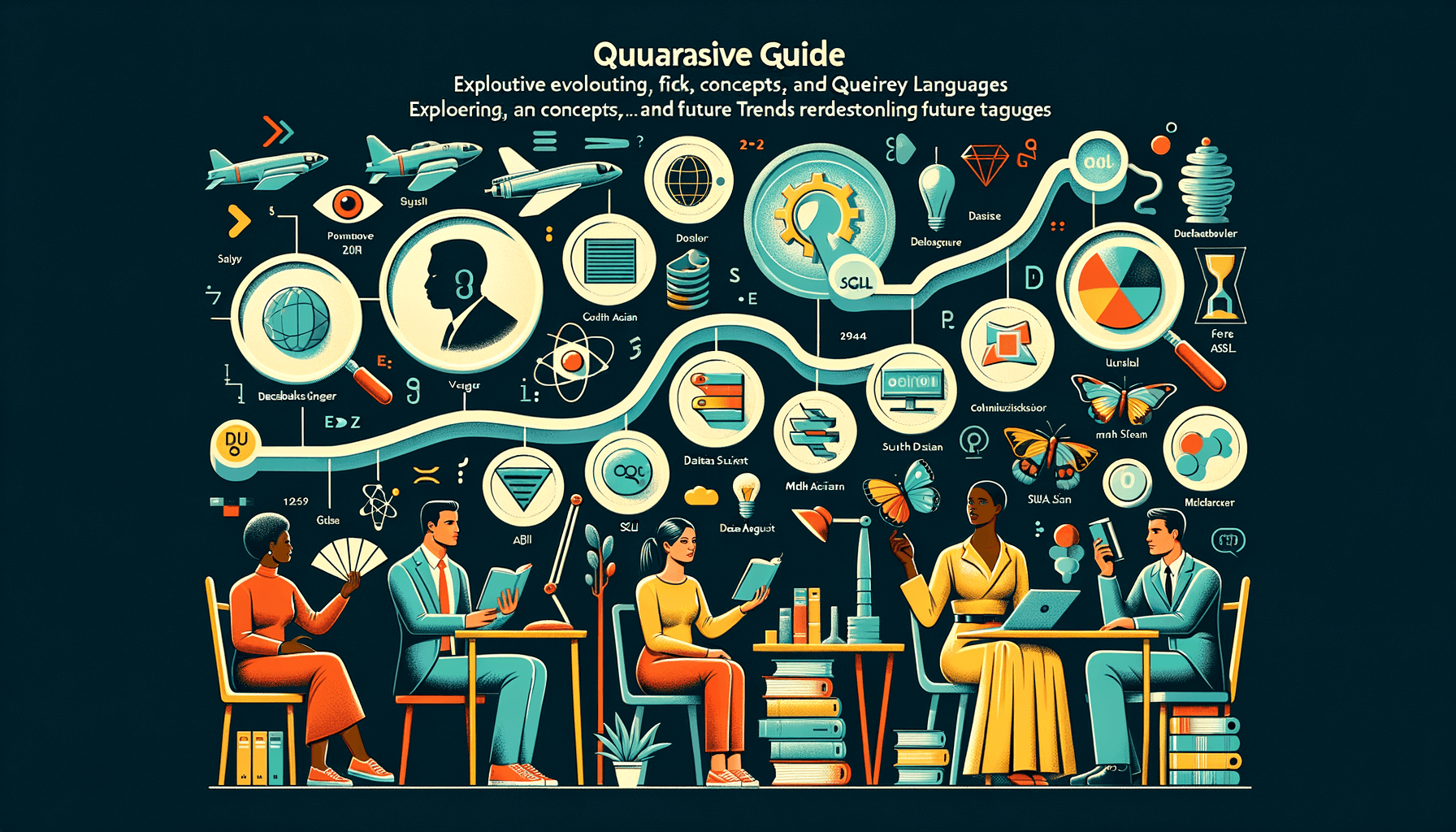A big variety of articles and resources

What is the best practical way to learn and master SQL?
 Sia Author and Instructor
Learn SQL
Sia Author and Instructor
Learn SQL
11 minute read
Learning SQL is like learning how to talk to databases. It's a skill that helps you get, change, and manage data. Whether you're a beginner or want to get better at SQL, there are many ways to learn and practice. This article will show you the best steps to become good at SQL, from understanding the basics to working on real projects.
Key Takeaways
- Start by learning the basic concepts and terms used in SQL.
- Choose the right resources, like books and online courses, to learn from.
- Set up your own SQL environment to practice.
- Work with real-world data to get hands-on experience.
- Join online communities and attend workshops to learn from others.
Understanding the Basics of SQL
Key Concepts and Terminology
To master SQL basics, we need to start with the key concepts and terminology. SQL, or Structured Query Language, is used to manage and manipulate databases. It allows us to perform tasks such as querying data, updating records, and managing database structures. Understanding terms like tables, rows, columns, and primary keys is essential. These are the building blocks of any SQL database.
Importance of SQL in Data Management
SQL plays a crucial role in data management. It helps us organize and retrieve data efficiently. Whether we are working with small datasets or large databases, SQL provides the tools needed to handle data effectively. By learning SQL, we can gain insights from data, make informed decisions, and support various applications. It's a skill that is valuable in many fields, from business to technology.
Learning SQL at your own pace is possible with the right resources. No credit card is required to start learning with SQLSkillz. Sign up and begin your journey today.
Choosing the Right Learning Resources
When it comes to learning SQL, selecting the right resources is crucial. There are many options available, and finding the one that fits your learning style can make a big difference.
Books and Online Courses
Books and online courses are great for structured learning. They provide a comprehensive overview of SQL concepts and often include exercises to practice. Websites like sqlskillz.com vs. datacamp.com offer courses that are perfect for beginners and allow you to learn at your own pace.
Interactive Tutorials and Coding Platforms
Interactive tutorials and coding platforms are excellent for hands-on learning. These platforms let you write and run SQL queries in real-time, which helps reinforce what you've learned. Many of these platforms also offer instant feedback, so you can correct mistakes as you go.
Choosing the right learning resources can set the foundation for mastering SQL. Whether you prefer books, online courses, or interactive tutorials, the key is to start practicing and keep learning.
Setting Up Your SQL Environment
Installing SQL Server or Database Management System
To start with SQL, we need to install a SQL server or a database management system (DBMS). There are several options available, such as MySQL, PostgreSQL, and Microsoft SQL Server. Choosing the right DBMS depends on our specific needs and the type of projects we plan to work on. Most of these systems offer free versions that are perfect for learning.
Configuring Your Development Environment
Once the DBMS is installed, the next step is to set up our development environment. This involves configuring tools like SQL Server Management Studio (SSMS) or pgAdmin, which help us interact with the database. We should also consider installing a code editor like Visual Studio Code, which supports SQL syntax highlighting and extensions. Setting up a proper environment ensures that we can write, test, and debug our SQL queries efficiently.
A well-configured development environment can significantly enhance our productivity and make learning SQL more enjoyable.
Hands-On Practice with Real-World Datasets
Finding and Importing Datasets
To truly master SQL, we need to work with real-world datasets. This means finding datasets that are both interesting and relevant to our goals. Websites like sqlskillz.com vs w3schools.com offer a variety of datasets that are perfect for beginners. These platforms allow us to learn at our own pace without the need for a credit card. Once we find a dataset, we can import it into our SQL environment to start practicing.
Creating and Managing Databases
After importing a dataset, the next step is to create and manage our databases. This involves setting up tables, defining relationships, and ensuring data integrity. By working with real data, we can better understand how SQL works in practical scenarios. This hands-on experience is invaluable for mastering SQL and becoming proficient in data management.
Mastering SQL Queries
When it comes to mastering SQL queries, we focus on understanding the fundamental syntax and exploring advanced techniques. SQL queries are essential for retrieving and manipulating data in databases. By mastering SQL queries, we can efficiently extract the information we need for analysis and decision-making. Practice is key to improving our query-writing skills. Additionally, learning about database design and normalization principles complements our understanding of SQL queries. Practice with real-world datasets enhances our ability to write effective queries.
Understanding Database Design and Normalization
Principles of Database Design
When we start designing a database, it's crucial to plan how data will be stored and accessed. Good design helps in managing data efficiently and ensures that the database performs well. We need to think about the relationships between different pieces of data and how they will interact. This is where understanding schema optimization becomes important.
Normalization Techniques
Normalization is a process that helps in organizing data to reduce redundancy and improve data integrity. By breaking down large tables into smaller ones and defining relationships between them, we can make sure our database is both efficient and easy to manage. For example, mastering techniques like inner join, left join, and right join can be very useful for effective database relationship management. This not only helps in maintaining data integrity but also boosts query performance.
Normalization is like cleaning up your room. Everything has its place, and it's easier to find what you need.
In summary, understanding database design and normalization is key to creating databases that are both powerful and easy to use.
Exploring SQL Functions and Procedures
Built-in Functions
In SQL, built-in functions are essential tools that help us perform various operations on data. These functions can be used to manipulate strings, perform calculations, and handle dates. For example, the SUM() function allows us to add up values in a column, while the CONCAT() function helps us join strings together. Understanding these functions can make our SQL queries more powerful and efficient.
Creating and Using Stored Procedures
Stored procedures are pre-written SQL codes that we can save and reuse. They help us automate repetitive tasks and ensure consistency in our database operations. To create a stored procedure, we use the CREATE PROCEDURE statement followed by the procedure's name and the SQL code it contains. Once created, we can execute the procedure using the EXEC command. This not only saves time but also reduces the risk of errors in our SQL scripts.
By mastering SQL functions and procedures, we can significantly enhance our ability to manage and manipulate data effectively.
Optimizing SQL Performance
Indexing Strategies
To make our SQL queries run faster, we need to use indexing strategies. Indexes help the database find data quickly without scanning the whole table. Choosing the right columns to index is very important. We should focus on columns that are often used in WHERE clauses or join conditions. However, too many indexes can slow down data modification operations like INSERT, UPDATE, and DELETE.
Query Optimization Techniques
Optimizing queries is another key part of improving SQL performance. We should always write clear and efficient queries. Using EXPLAIN or EXPLAIN PLAN can help us understand how the database executes our queries. This way, we can spot and fix any slow parts. Breaking down complex queries into simpler ones can also help. Additionally, we should avoid using SELECT * and instead specify only the columns we need. This reduces the amount of data the database has to process.
By focusing on indexing and query optimization, we can significantly improve the performance of our SQL databases. This ensures faster data retrieval and a more efficient system overall.
Learning from SQL Community and Forums
Learning from the SQL community and forums is a valuable way to enhance our SQL skills. By participating in online communities, we can engage with fellow learners and experts to exchange knowledge and seek help when needed. Attending SQL workshops and meetups provides opportunities to network with professionals and gain insights into industry trends and best practices. Engaging with the SQL community fosters a collaborative learning environment where we can grow our expertise and stay updated on the latest developments in the field.
Working on SQL Projects and Case Studies
When we work on SQL projects and case studies, we get the opportunity to apply our knowledge in real-world scenarios. This hands-on experience helps us understand how to use SQL in practical situations and solve actual problems. By developing personal projects, we can explore different aspects of SQL and enhance our skills. Analyzing case studies allows us to see how SQL is used in various industries and learn from real examples. Engaging with SQL projects and case studies is a valuable way to deepen our understanding and proficiency in SQL.
Preparing for SQL Certification Exams
Choosing the Right Certification
When it comes to SQL certifications, there are several options available. It's important to choose the one that aligns with your career goals. Some popular certifications include Microsoft Certified: Azure Data Engineer Associate, Oracle Database SQL Certified Associate, and IBM Certified Database Administrator. Selecting the right certification can open doors to new job opportunities and career advancement.
Study Tips and Resources
Preparing for a certification exam requires a strategic approach. Here are some tips to help you succeed:
- Create a study plan: Outline what topics you need to cover and allocate time for each.
- Use a mix of resources: Books, online courses, and practice exams can provide a well-rounded understanding.
- Join study groups: Collaborating with others can offer new insights and keep you motivated.
- Take practice exams: These can help you get familiar with the exam format and identify areas where you need improvement.
The Mastering MySQL Performance and Query Optimization course offers practical SQL training with real-world problem-solving, expert-led instruction, and hands-on projects for career advancement.
By following these tips and utilizing the right resources, you'll be well-prepared to ace your SQL certification exam.
Getting ready for your SQL certification exams can be a breeze with the right resources. Our website offers a variety of courses designed to help you master SQL and ace your exams. Whether you're a beginner or looking to refine your skills, we have something for everyone. Don't wait any longer, visit our site and start your journey to becoming a SQL expert today!
Conclusion
In summary, mastering SQL requires a mix of theory and hands-on practice. Start with the basics, like understanding databases and learning simple queries. Then, move on to more complex topics, such as joins and subqueries. Practice regularly by working on real-world projects or using online platforms. Don't forget to review and revise what you've learned to keep your skills sharp. With dedication and consistent effort, anyone can become proficient in SQL.
Frequently Asked Questions
What is SQL?
SQL stands for Structured Query Language. It's a language used to interact with databases. You can use it to add, delete, or get data from a database.
Why is SQL important?
SQL is important because it helps you manage and organize data. Many businesses use it to make sense of their data and make smart decisions.
How can I start learning SQL?
You can start by reading books, taking online courses, or using interactive tutorials. There are many free resources available to help you get started.
Do I need to install any software to learn SQL?
Yes, you'll need to install a SQL server or a database management system on your computer. This will help you practice writing SQL queries.
What are some good datasets to practice SQL?
You can find free datasets online. Websites like Kaggle and government databases have lots of data you can use for practice.
What are SQL queries?
SQL queries are commands you give to the database to get the information you need. They can be simple, like getting a list of names, or complex, like finding trends in data.
How can I make my SQL queries run faster?
You can make your queries faster by using indexing and optimizing your query techniques. Learning these skills will help you manage large datasets more efficiently.
Are there any certifications for SQL?
Yes, there are many certifications you can get to show your SQL skills. Some popular ones are offered by Microsoft, Oracle, and other tech companies.







